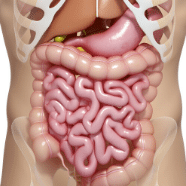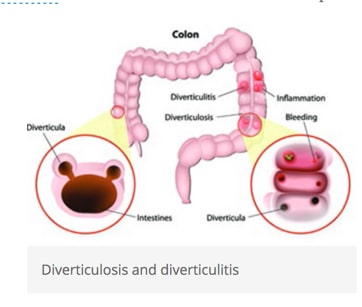
Diverticulitis

Summary
What is diverticulosis?
Diverticula are small pouches, or sacs, that bulge outward through weak spots in your colon. They mostly form in the lower part of the colon. Diverticulosis is a condition in which you have these pouches. Most people who have diverticulosis do not have symptoms or problems. But sometimes the pouches can cause symptoms or become inflamed.
What is diverticulitis?
Diverticulitis is the name for the condition you have when one or more of the pouches get inflamed. Diverticulitis may come on suddenly. It can sometimes cause serious health problems.
What is diverticular disease?
Diverticular disease is a condition that happens when the pouches cause:
- Chronic (long-term) symptoms
- Diverticular bleeding
- Diverticulitis or diverticulitis complications
What causes diverticulosis and diverticulitis?
Researchers aren’t sure what causes diverticulosis and diverticulitis. They think certain factors may play a role in causing or increasing the risk for these conditions, including:
- Your genetics. Certain genes may make some people more likely to develop the conditions.
- Lifestyle factors such as:
- Diets low in fiber and high in red meat
- Lack of physical activity
- Taking certain medicines, such as nonsteroidal anti-inflammatory drugs (NSAIDs) and steroids
- Having obesity
- Smoking
Researchers are also looking at other possible factors that may play a role in these conditions. Those factors include bacteria or stool (poop) getting caught in a pouch in your colon and changes in the microbiome in the intestines. Your microbiome is made up of the bacteria and other organisms in your intestines.
Who is more likely to develop diverticulosis and diverticulitis?
Diverticulosis is common, especially as people age. More than one-third of U.S. adults between the ages of 50 and 59 have diverticulosis. More than two-thirds who are over age 80 have it. Most of those people will not have symptoms or problems. But some of them will develop diverticulitis.
What are the symptoms of diverticulosis and diverticulitis?
Diverticulosis usually doesn’t cause symptoms. But some people can have chronic symptoms such as:
- Bloating
- Constipation or diarrhea
- Cramping or painin the lower abdomen (belly)
Diverticulitis may cause acute symptoms such as:
- Abdominal pain, most often in the lower left side of your abdomen
- Constipation or diarrhea
- Fevers and chills
- Nausea or vomiting
The pain caused by diverticulitis is usually severe and comes on suddenly. Less often, the pain may be mild and worsen over several days.
What other problems can diverticulosis and diverticulitis cause?
Some people with diverticulosis and diverticulitis may develop serious health problems (complications). Diverticular bleeding happens when a small blood vessel within the wall of a pouch bursts. The bleeding may be severe and sometimes even life-threatening.
People with diverticulitis can also develop serious problems such as:
- Abscess, a painful, swollen, pus-filled area caused by infection
- Fistula, an abnormal opening or passage between the colon and another part of the body, such as the bladder or vagina
- Intestinal obstruction, a partial or total blockage that keeps food, fluids, air, or stool from moving through your intestines
- Perforation, or a hole, in your colon
- Peritonitis, an infection of the lining of the abdominal cavity
How are diverticulosis and diverticulitis diagnosed?
Diverticulosis may be found when your health care provider is doing tests for another reason. Diverticulitis is usually found when you are having an acute attack.
To make a diagnosis, your provider will review your medical history, do a physical exam, and order tests. The tests may include:
- Blood tests
- Stool tests
- Imaging tests such as CT scan, ultrasound, or MRI
- Colonoscopy
What are the treatments for diverticulosis and diverticulitis?
f your diverticulosis is causing chronic symptoms, your provider may recommend:
- High-fiber foods or fiber supplements
- Antibiotics
- Medicines to reduce inflammation
- Probiotics
If you have diverticulitis without complications, your provider may recommend treatment at home. However, you probably need treatment in the hospital if you have severe diverticulitis, diverticulitis with complications, or a high risk for complications.
Treatments for diverticulitis may include:
- Antibiotics, except for very mild cases.
- A clear liquid diet for a short time to rest the colon. Your provider may suggest slowly adding solid foods to your diet as your symptoms improve.
- Medicines for pain. This is usually acetaminophen instead of nonsteroidal anti-inflammatory drugs (NSAIDs). NSAIDs may increase the chance of diverticulitis complications.
- Antispasmodic medicines to relieve spasms.
If your diverticulitis doesn’t improve with treatment or if it causes complications, you may need surgery to remove part of your colon.
Can diverticulitis be prevented?
Your provider may recommend lifestyle changes to prevent diverticulitis:
- Eating a diet high in fiber and low in red meat
- Being physically active on a regular basis
- Not smoking (and quitting smoking if you are a smoker)
- Reaching and maintaining a healthy weight
NIH: National Institute of Diabetes and Digestive and Kidney Diseases
Source: MedlinePlus, National Library of Medicine.
Information pulled from the Diverticulosis and Diverticulitis page.
MedlinePlus brings together authoritative health information from the National Library of Medicine (NLM), the National Institutes of Health (NIH), and other government agencies and health-related organizations.
Diverticular Disease
American Academy of Family Physicians
Diverticular Disease
National Institute of Diabetes and Digestive and Kidney Diseases
Diverticulitis
Mayo Foundation for Medical Education and Research
Diverticulosis and Diverticulitis
American College of Gastroenterology
Abdominal and Pelvic CT (Computed Tomography)
Radiological Society of North America
Abdominal exploration - series
Medical Encyclopedia
Colonoscopy: MedlinePlus Health Topic
National Library of Medicine
Fecal Occult Blood Test (FOBT)
National Library of Medicine
Lower GI Series (Barium Enema)
National Institute of Diabetes and Digestive and Kidney Diseases
Colon diverticula - series
Medical Encyclopedia
Colostomy - series
Medical Encyclopedia
Treatment for Diverticular Disease
National Institute of Diabetes and Digestive and Kidney Diseases
Listen to our
latest Podcast!





